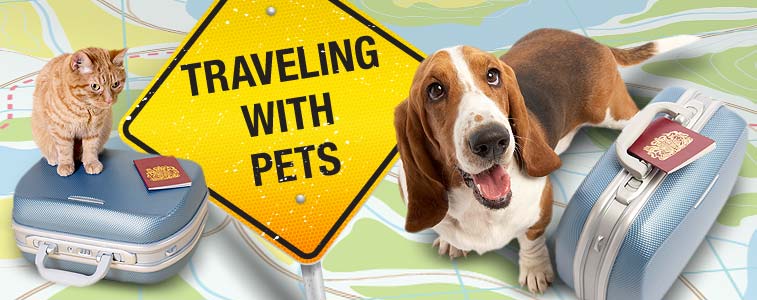
TRAVELING WITH PETS
Now that many hotels and privately owned accommodations are opening their doors to pets, traveling with furry companions has become an option for many families. Planning ahead is important whether you are traveling with or without pets. Call ahead to find out any restrictions (size of dog, leaving pet alone in room)
If traveling by car:
- Be sure your pet is comfortable in car (not anxious, not prone to car sickness).
- Seat covers protect car fabric and prevent dog from slipping.
- Safety harness or travel carriers help to secure dog in case of sudden stops or accidents.
- Keep cats in carrier for their safety as well as preventing driver from being distracted.
- If feeding ahead of time, provide a very small meal.
- Do not allow dog to stick head out of window - particles can get into eyes, other flying objects could be dangerous
If flying:
DO NOT FLY WITH SICK OR DEBILITATED PETS, THEY WILL NOT BE ABLE TO HANDLE THE STRESS!
- Call airline ahead of time to learn specifications for travel with pet (health certificate, vaccinations, size restrictions)
- Book a direct flight and book early as the number of pets is limited per flight.
- Health certificates signed by a veterinarian are usually needed within 10 days of travel.
- Investigate carrier specifications well ahead of time.
- Cats and small dogs traveling in the plane’s cabin need to be in small, soft sided carriers.
- Dogs traveling in cargo section should be in sturdy carriers labeled “live animal” with arrows showing upright position.
- Be sure carriers are well labeled with your contact information, pet’s name and destination.
- Request an aisle seat. Avoid sitting behind the bulk head as there will be no seat under which you can place a carrier.
- Allow pets to spend time in carriers before travel so they will be acclimated
NEVER SEDATE PET FOR FIRST TIME ON DAY OF TRAVEL
- Tranquilizers can be very unpredictable.
- Always do a trial with medication before you travel to see how pet will react.
- Line carrier with paper towels or pee pee pads in case of accident.
IF FLYING OVERSEAS, AN INTERNATIONAL HEALTH CERTIFICATE IS NEEDED. THIS MUST BE OBTAINED BY AN ACCREDITED VETERINARIAN.
Other tips:
Items to pack
- regular food, treats, dishes, bed, toys, fresh water
- leash or harness
- medications (heartworm preventative, flea/tick medications, seizure medication, other important daily medicine)
- bland food and medications in case pet has a sensitive stomach (consult your dog’s veterinarian)
- research phone numbers of local vets, emergency clinics in case needed
- Bring number for ASPCA Poison Control 1-888-426-4435
- be sure pet has ID tag with cell phone number, temporary ID tags can be made with address of where you are vacationing
- pooper scooper/bags and litter box + litter
- recent photo of pet (in case it gets lost)
- proof of vaccines and medical records
- grooming supplies (shampoo, brush)
- carpet cleaning product in case of accidents
First Aid Kits are recommended
- bandages, Telfa pads, gauze
- triple antibiotic ointment
- styptic powder for broken nails
- digital thermometer and lubricating jelly
- hydrogen peroxide /saline solution for cleaning wounds
TRAVEL WITHOUT PETS
Travel plans can be very exciting and it may be easy to become distracted from making the necessary arrangements for pets prior to your vacation. Be sure to make arrangements for pets to be taken care of in your home, to stay with a friend, or to stay at a boarding facility.
DO NOT WAIT UNTIL THE LAST MINUTE! BOARDING KENNELS BOOK UP QUICKLY AT HOLIDAY TIMES AND IN THE SUMMER MONTHS. MAKE SURE YOUR PET SITTER WILL BE AVAILABLE WHILE YOU PLAN TO BE ON VACATION.
If leaving a pet at home, be sure to choose a reliable pet sitter. Make sure he/she is well acquainted with your pets - the last thing you want is for your dog to not allow the sitter into your home!
Leave a written list of instructions for sitter.
- note amount of food to be fed, normal feeding times, number of treats/snacks
- note how often and at what times dog goes out to go to the bathroom
- note any common problems to monitor (cat with urinary problems, pets with seizures, arthritis, diarrhea, etc)
If leaving pets in kennel:
- Get referrals to make sure facility is reputable.
- Make sure that if kennel is not affiliated with vet hospital, they will be able to provide medical care in case of emergency.
- Make a scheduled and surprise visit to kennel to evaluate
- Bring pet’s favorite toys, blankets, and regular food to avoid likelihood of vomiting or diarrhea
Whether leaving pet with sitter or in kennel, ALWAYS LEAVE EMERGENCY CONTACT NUMBERS
GIVE PET SITTER CONSENT TO APPROVE MEDICAL TREATMENT IN CASE OF EMERGENCY. You can call vet office to let them know pet sitter has authority to okay any treatment needed. You can even leave credit card number on file.
Some helpful websites:










